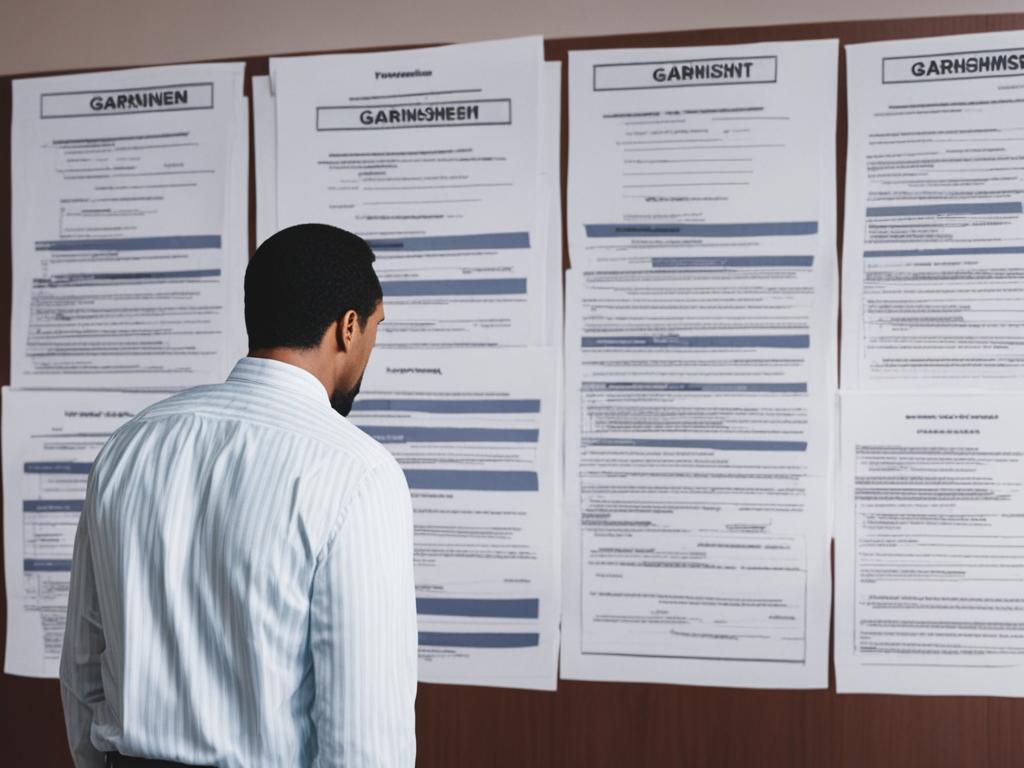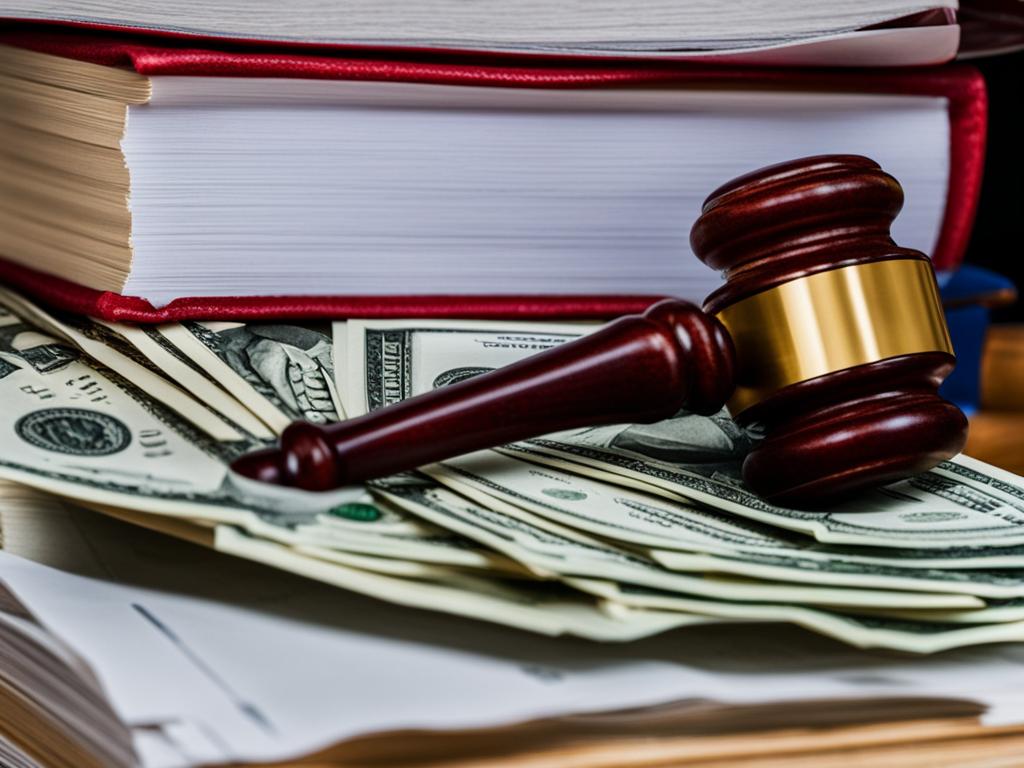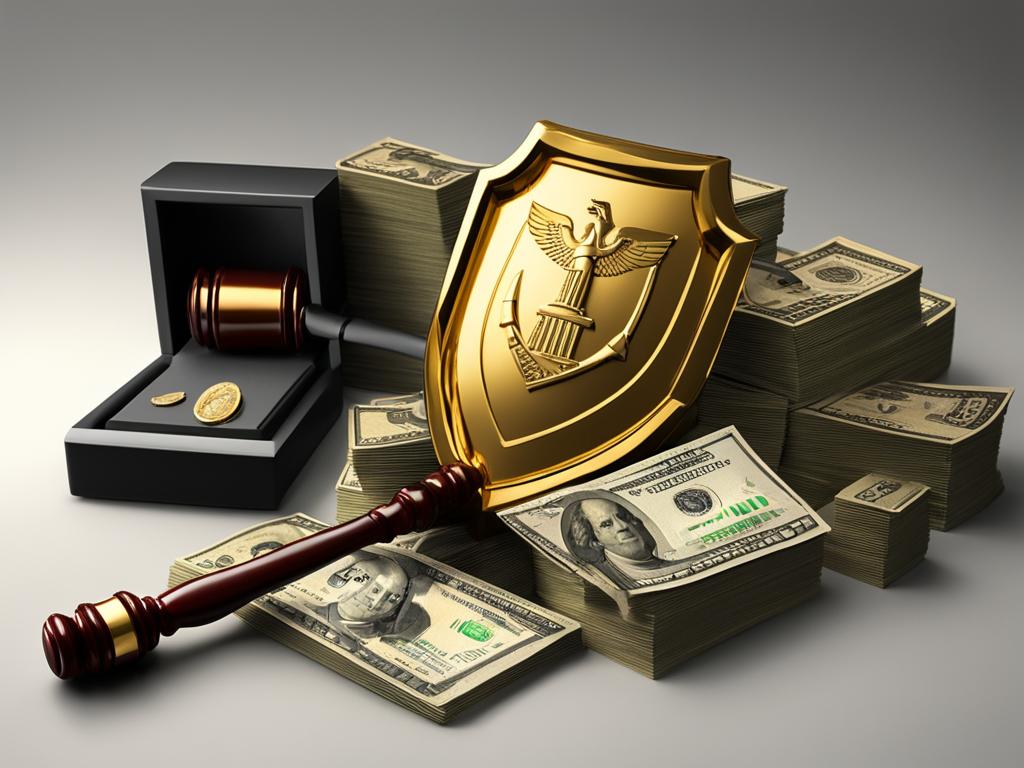Car Accident Lawsuit: What Can Creditors Take?
Being sued for a car accident can have serious financial consequences. If you find yourself in this situation, it is crucial to understand what creditors can legally take and how to protect your assets during a car accident lawsuit. In this article, we will discuss the potential legal consequences of a car accident, the personal property that can be taken in a lawsuit, and the financial repercussions you may face.
Key Takeaways:
- Being sued for a car accident can result in financial repercussions.
- Creditors may seek to take certain assets to satisfy the judgment.
- Garnishment is a legal process where a creditor collects payment for a debt directly from a personal injury settlement.
- Not all states require garnishment for personal injury settlements.
- It is possible to dispute a garnishment request on a personal injury settlement.
What is Garnishment?
Garnishment is a legal process used by creditors to collect payments for outstanding debts directly from a personal injury settlement. In the context of a car accident lawsuit, a creditor, such as a medical provider or a credit card company, can pursue garnishment to satisfy the debt owed to them.
During garnishment, a certain amount of money is withheld from the personal injury settlement to be used for debt repayment. This deduction is determined by the court and is typically based on the amount of debt owed. After the deduction, the remaining settlement amount is then given to the plaintiff to provide compensation for their injuries and damages.
Garnishment allows creditors to bypass the debtor and access the funds they are owed more directly. It is important to note that garnishment can only be carried out with a court order and must adhere to the legal guidelines set forth in the jurisdiction.
“Garnishment is a powerful tool that creditors can utilize to collect the money they are owed. It provides them with a means to recover their debts by tapping into the funds available in a personal injury settlement. This process ensures that the creditor receives the payment they are owed, albeit directly from the settlement amount, while the plaintiff still receives compensation for their injuries.”
How Garnishment Works in a Car Accident Lawsuit
In the context of a car accident lawsuit, garnishment occurs when a creditor seeks to collect payment for outstanding debts related to the accident. This can include medical bills, property damages, or other expenses incurred as a result of the accident.
When the court determines that garnishment is appropriate, a specific amount will be deducted from the personal injury settlement to satisfy the creditor’s claim. This amount is typically based on the owed debt, and the court ensures that the garnishment is within legal limits.
Once the deduction is made, the remaining settlement funds are disbursed to the plaintiff. This allows the plaintiff to receive compensation for their injuries and damages, while also addressing their outstanding debts.
Garnishment can be a complex process, and it is vital for both creditors and debtors to understand their rights and obligations. Consulting with a legal professional experienced in debt collection and personal injury settlements can provide guidance and help navigate the garnishment process.
Is Garnishment Required for Personal Injury Settlements?
Garnishment is not mandatory in every state for personal injury settlements. The laws regarding garnishment vary across the United States. If a plaintiff has outstanding debt, it is important to share this information with their personal injury attorney. Creditors cannot demand money from a settlement if the plaintiff’s balances are paid in full.
Garnishment laws surrounding personal injury settlements differ by state. While some states may require garnishment to satisfy outstanding debts, others may not have such requirements. It is crucial that plaintiffs consult their personal injury attorney to navigate the specific regulations governing their settlement.
Plaintiffs with outstanding debt should disclose this information to their attorney. By doing so, the attorney can effectively advocate for their client’s rights and ensure that creditors do not claim more than what is owed. When the plaintiff has fulfilled their financial obligations, creditors cannot legally demand payment from the personal injury settlement.
“Plaintiffs should be proactive in informing their personal injury attorney about any outstanding debt. This enables the attorney to protect their client’s interests and ensure that creditors do not seize funds beyond what is owed.”
Personal injury settlements are intended to compensate individuals for their physical, emotional, and financial losses resulting from an accident or injury. It is crucial to understand and abide by the specific laws and regulations pertaining to personal injury settlements in the state where the lawsuit is filed.
Is It Possible to Dispute a Garnishment Request on a Personal Injury Settlement?
When facing a garnishment request on a personal injury settlement, it is possible to dispute the request and protect your hard-earned compensation. To successfully challenge the garnishment, the plaintiff must present compelling evidence to the court. The court carefully evaluates the objection, taking into consideration the best interest of both the plaintiff and the creditor. It is important to note that the court decision on the dispute may take several months to be rendered.

Disputing a garnishment request requires thorough preparation and gathering of evidence. The plaintiff should consult with their attorney to ensure they have a solid case. Evidence that may support a dispute can include:
- Financial Records: Provide detailed documentation of your current financial situation, including income, expenses, and existing debts.
- Bank Statements: Present bank statements that clearly show the source of the funds in your personal injury settlement.
- Treatment Expenses: Include medical bills and receipts related to the injury to demonstrate the necessity of the settlement funds for ongoing treatment.
- Communication: Maintain clear and concise communication with your attorney to ensure they have all the necessary information to build a strong case on your behalf.
Remember, each garnishment dispute is unique, and the court’s decision will depend on the specific circumstances of the case. A skilled attorney can guide you through the process and advocate for your best interests.
| Evidence | Description |
|---|---|
| Financial Records | Detailed documentation of current financial situation |
| Bank Statements | Statements showing the source of funds in personal injury settlement |
| Treatment Expenses | Medical bills and receipts related to the injury |
| Communication | Clear and concise communication with attorney |
Exceptions to Garnishment of a Personal Injury Settlement
While garnishment is a common method for creditors to collect payment from a personal injury settlement, there are exceptions that may apply in certain situations. One such exception involves medical costs related to the injury. In some cases, a court may prioritize the plaintiff’s need for treatment and allow them to use a portion of the settlement to cover substantial medical expenses.
Garnishment of a personal injury settlement typically involves a creditor seeking payment for a debt. However, if the court determines that the plaintiff requires extensive medical treatment and that the expenses are directly related to the injury, they may decide to exempt a portion of the settlement from garnishment.
“The court’s decision to exempt medical costs from garnishment is based on the principle of prioritizing the plaintiff’s health and well-being. This ensures that the necessary treatment expenses are covered, allowing the individual to recover from the injury without undue financial burden.”
Treatment Expenses and Court Decision
When determining whether to exempt treatment expenses from garnishment, the court considers various factors such as the severity of the injury, the potential impact on the plaintiff’s daily life, and the availability of other sources to cover medical costs. The court’s decision on exemption may vary based on the specific circumstances of the case.
It is important for plaintiffs facing garnishment of their personal injury settlement to consult with their attorney and provide detailed information about their medical expenses. An experienced attorney can advocate for the exemption of treatment expenses and present a compelling case to the court.
| Factors Considered by the Court | Impact on Garnishment |
|---|---|
| Severity of the injury | The more severe the injury, the higher the likelihood of exemption |
| Impact on daily life | If the injury significantly affects the plaintiff’s ability to function, exemption is more likely |
| Availability of other sources | If there are no other sources to cover medical costs, exemption may be favored |
It is essential to provide clear documentation and evidence of the treatment expenses incurred and their direct relation to the injury. This will strengthen the plaintiff’s case for exemption and improve the chances of a favorable court decision.
By exempting medical costs from garnishment, the court aims to ensure that plaintiffs have access to the necessary treatment and care they require to recover from their injuries. This exemption recognizes the significant financial burden that medical expenses can impose and seeks to alleviate this burden for the plaintiff.
In summary, while garnishment is a common method for creditors to collect payment from a personal injury settlement, there are exceptions that may apply. The court’s decision to exempt treatment expenses from garnishment is based on prioritizing the plaintiff’s health and well-being. By presenting clear, compelling evidence of the treatment expenses incurred, plaintiffs can improve their chances of an exemption and protect their settlement.
How Can I Prevent Creditors from Garnishing My Personal Injury Settlement?
Preventing creditors from garnishing your personal injury settlement requires proactive measures and effective communication with your personal injury attorney. By taking the following steps, you can minimize the risk of garnishment and protect your settlement:
- Be Transparent About Outstanding Debt: Inform your attorney about any outstanding debt you have. This information will aid in devising a strategic approach to minimize garnishment.
- Structured Settlement: Your attorney can help structure your settlement request in a way that reduces the chances of garnishment. By negotiating a structured settlement, you can receive periodic payments instead of a lump sum, making it less attractive for creditors.
- Keep Settlement Funds Separate: Establish a separate bank account specifically for your settlement funds. By keeping your settlement money separate from other funds, you can clearly demonstrate its intended use and make it less susceptible to garnishment.
- Obtain a Certified Copy of the Judgment: Obtain a certified copy of the court judgment stating the details and amount of the settlement. This document serves as proof of the debt owed and can help protect your settlement.
“To prevent creditors from garnishing your personal injury settlement, it is crucial to communicate openly with your attorney, adopt a structured settlement approach, keep your funds separate, and obtain a certified copy of the judgment.”
Protecting Your Assets Infographic
| Step | Description |
|---|---|
| 1 | Be transparent about outstanding debt |
| 2 | Discuss structured settlement options with your attorney |
| 3 | Keep settlement funds separate in a dedicated bank account |
| 4 | Obtain a certified copy of the court judgment |

Will Getting a Lawsuit Loan Cause My Personal Injury Settlement to Get Garnished?
Many individuals wonder whether obtaining a lawsuit loan will result in the garnishment of their personal injury settlement. Rest assured, getting a lawsuit loan does not automatically lead to the garnishment of your settlement funds.
“Obtaining a lawsuit loan does not automatically lead to the garnishment of your personal injury settlement.”
When you receive a settlement, the repayment of the lawsuit loan takes priority. The pre-settlement funding company will deduct the amount owed from your settlement before you receive the remaining funds. This ensures that the loan is repaid as agreed, without affecting the garnishment of your personal injury settlement.
It’s important to note that if your case is not successful and you do not receive a settlement, you are not responsible for repaying the lawsuit loan. Therefore, whether you win or lose your case, the loan repayment is handled accordingly.
| Scenario | Lawsuit Loan Repayment |
|---|---|
| Successful Case | Deducted from your settlement before receiving the remaining funds |
| Unsuccessful Case | No repayment required |
By understanding the terms and conditions associated with lawsuit loans, you can make informed decisions about your personal injury settlement and repayment obligations.
How Can I Get a Lawsuit Loan in a Personal Injury Case?
To secure a lawsuit loan for your personal injury case, consider exploring financing options provided by companies specializing in pre-settlement funding. These loans offer a viable financial solution that can assist you during the course of your case, ensuring that you have the necessary funds to cover various expenses.
The application process for a lawsuit loan involves providing details about your personal injury case and communicating with the loan provider. The loan provider will evaluate the strength of your case, the expected settlement amount, and the probability of winning your lawsuit. Once approved, the loan amount will be disbursed to you, typically in a lump sum or in installment payments based on your needs.
Applying for a lawsuit loan involves the following steps:
- Gather all essential documents related to your personal injury case, such as medical reports, accident reports, and insurance information.
- Research reputable pre-settlement funding companies and choose the one that offers favorable terms and conditions.
- Fill out the application form provided by the chosen loan provider, and provide accurate information about your case and financial circumstances.
- Submit the required documents along with your application, ensuring that all information is complete and accurate.
- Wait for the loan provider to review your application and assess the suitability of your case for funding.
- Once approved, carefully review the loan agreement, paying close attention to the interest rates, repayment terms, and any additional fees.
- If you agree to the loan terms, sign the agreement and return it to the loan provider.
- Upon receiving the signed agreement, the loan provider will disburse the funds to you.
By opting for a lawsuit loan, you can alleviate financial stress and maintain stability while waiting for your personal injury case to reach a resolution. It is important to work with a reputable loan provider and carefully consider the terms and conditions before making a decision.

Lawsuit Loan Application Checklist
| Documents | Notes |
|---|---|
| Medical reports | Include all relevant medical documentation related to your injuries and treatment. |
| Accident reports | Provide copies of any accident reports filed with the police or other relevant authorities. |
| Insurance information | Include details of your insurance coverage and any claims made. |
| Past and current medical bills | Compile all medical bills related to your injury, including those already paid and outstanding balances. |
| Employment records | If your injury has affected your ability to work, provide documentation of lost wages or income. |
| Legal representation information | Include the contact details of your personal injury attorney. |
Understanding New York State Laws for Personal Injury Settlements
In New York State, personal injury settlements are partially exempt from most creditors’ reach. Creditors are generally prohibited from seizing settlements to satisfy existing debts. However, certain exemptions and bankruptcy laws may apply. It is important to understand the specific laws in your state to protect your assets.
Protecting Your Compensation in New York State
In New York State, it is essential to take steps to protect your compensation and personal injury settlement from potential seizure by creditors. By understanding the available options, such as bankruptcy exemptions and federal exemptions, you can safeguard your funds and ensure financial stability.
Bankruptcy Exemptions
Applying for bankruptcy exemptions can provide significant protection for your personal injury settlement. These exemptions allow you to keep a certain amount of assets, including your compensation, when filing for bankruptcy. In New York State, the exemptions vary depending on the chapter of bankruptcy you file.
To qualify for bankruptcy exemptions, you must meet specific requirements based on your financial situation. Consulting with a bankruptcy attorney or a financial advisor can provide you with the necessary guidance to make informed decisions and maximize your exemption options.
Federal Exemptions
In addition to New York State exemptions, federal law also provides exemptions that can help protect your compensation. These exemptions cover various types of assets, allowing you to retain a portion of your settlement. However, it’s essential to consult with a legal professional to understand the eligibility criteria and the specific exemptions that may apply to your situation.
Keeping Your Settlement Funds Separate
A crucial aspect of protecting your compensation is to keep your settlement funds separate from other accounts and assets. Maintaining a separate bank account specifically for your settlement funds helps you clearly distinguish them and minimizes the risk of commingling with other funds.
By separating your settlement funds, you establish a clear paper trail, making it easier to demonstrate that the funds are exempt from being seized by creditors. This separation also ensures that you can account for every dollar of your settlement, aiding in the protection of your compensation.
Focus on Compensation Protection
It is essential to prioritize compensation protection throughout the legal process. By understanding the available bankruptcy and federal exemptions, as well as keeping your settlement funds separate, you can safeguard your personal injury settlement from the reach of creditors.
Always consult with a legal professional who specializes in bankruptcy and personal injury law to navigate the complexities of protecting your compensation effectively.

Maintaining Your Settlement Funds in New York State
To maintain your settlement funds in New York State, it is crucial to protect them from commingling with other non-exempt funds. Commingling exempt and non-exempt monies can put your settlement at risk and potentially make it vulnerable to seizure by creditors.
One effective strategy to prevent commingling is to keep your settlement funds in a separate savings account. By maintaining a dedicated account solely for your settlement funds, you can ensure that they remain distinct and separate from your other financial resources.
This separation serves two important purposes:
- Asset Protection: Keeping your settlement in a separate savings account helps shield the funds from potential claims by creditors. In the event that you face financial challenges in the future, such as bankruptcy or outstanding debts, having distinct settlement funds can provide an added layer of protection.
- Tracking and Transparency: By isolating your settlement funds, you can maintain a clear record of the amount received and any subsequent transactions. This transparency can be crucial for legal purposes, allowing you to demonstrate the exact allocation and use of the funds if required in future legal proceedings or disputes.
When managing your settlement funds, it is important to avoid depositing any additional funds or income into the dedicated savings account. Deposit only the settlement funds and refrain from commingling it with any other personal finances or assets.
“Commingling settlement funds with other non-exempt funds can jeopardize your financial protection and potentially expose the funds to garnishment. If you want to safeguard your settlement, keep it separate.”
By following these practices and maintaining a separate savings account for your settlement funds, you can better protect and manage your assets in New York State.

The Lawsuit Aftermath: Protecting Your Assets in Alabama
After a car accident lawsuit in Alabama, understanding how to protect your assets from seizure is crucial. If the plaintiff wins the lawsuit, the court may authorize the seizure of your assets to pay for the awarded damages. Therefore, it is important to take proactive steps to safeguard your assets.
Working with an Attorney to Establish Asset Protection Trusts
One effective method for protecting your assets is to work with an experienced attorney to establish asset protection trusts. These trusts can help shield your assets from seizure by placing them under the control of a trustee. By creating a legally separate entity, you can secure your assets and limit the ability of creditors to access them.
Negotiating Affordable Payment Plans with the Plaintiff
In some cases, you may be able to negotiate affordable payment plans with the plaintiff to protect your assets. By reaching a mutually beneficial agreement, you can satisfy the awarded damages without putting your assets at risk of seizure. It is important to consult with your attorney to determine the best approach for negotiating a payment plan that suits your financial circumstances.
Understanding Garnishment Actions and Financial Repercussions
Garnishment actions can have significant financial repercussions. If your assets are seized, it can disrupt your financial stability and impact your ability to meet other financial obligations. By taking proactive steps to protect your assets, such as establishing asset protection trusts or negotiating payment plans, you can minimize the risk of experiencing severe financial consequences.

The Importance of Legal Representation in Alabama Car Accident Lawsuits
Hiring an experienced Alabama car accident attorney is crucial in protecting yourself in a car accident lawsuit. Alabama’s contributory negligence law means that anyone even partially at fault for an accident may be ineligible to recover compensation. An attorney can investigate the crash, determine fault, and employ defensive strategies to protect you from financial liability.
When it comes to car accident lawsuits in Alabama, having skilled legal representation is essential. The intricacies of the legal system and the court proceedings can be overwhelming, especially when navigating fault determination and financial liability.
An Alabama car accident attorney understands the complexities involved in these cases and can provide the guidance needed throughout the legal process. They have the knowledge and experience to assess the circumstances of the accident, gather evidence, and build a solid case on your behalf.
Protecting Your Rights
One of the primary reasons to hire a skilled attorney is to protect your rights. Car accidents can result in significant physical, emotional, and financial hardships. Without proper legal representation, you may face challenges when seeking compensation for medical expenses, property damage, loss of income, and pain and suffering.
Your attorney will work diligently to ensure your rights are upheld. They will advocate on your behalf, negotiate with insurance companies, and, if necessary, take your case to court to secure the compensation you deserve.
Navigating the Complexities of Fault Determination
In Alabama, fault determination is a critical factor in car accident lawsuits. The state follows a contributory negligence law, which means that if you are even partially responsible for the accident, you may be barred from recovering any compensation.
An experienced Alabama car accident attorney can carefully assess the evidence, gather witness statements, and reconstruct the accident scene to determine fault accurately. They will gather all the necessary information to build a strong case that highlights the other party’s negligence, minimizing your own liability.
Minimizing Financial Liability
Car accidents can have severe financial implications. Aside from medical expenses and property damage, you may also face potential lawsuits and claims for compensation from other parties involved in the accident.
A knowledgeable attorney can help protect you from excessive financial liability. They will strategize and negotiate on your behalf, aiming to mitigate potential financial burdens arising from the accident. By having legal representation, you can focus on recovering and moving forward while your attorney handles the legal complexities.
Conclusion
Being sued for a car accident can have significant financial consequences. The laws regarding garnishment and asset protection play a crucial role in determining the impact on your finances. To navigate the aftermath of a car accident lawsuit and work towards financial recovery, it is essential to seek legal representation and follow the appropriate steps.
Understanding the complexities of garnishment and its legal requirements can help you protect your assets. By communicating openly with your personal injury attorney and addressing any outstanding debt, you can minimize the risk of creditors seizing your personal injury settlement. It is also important to keep your settlement funds separate from other non-exempt funds and consider utilizing bankruptcy exemptions to safeguard your compensation.
Remember, hiring an experienced attorney specializing in car accident lawsuits is vital to protect yourself from financial liability. They can investigate the accident, determine fault, and employ defensive strategies to ensure a favorable outcome. By seeking legal advice and taking necessary precautions, you can regain control of your financial situation and work towards a successful recovery.
FAQ
What can creditors take in a car accident lawsuit?
Creditors may seek to take certain assets to satisfy the judgment. The specific assets that can be taken vary depending on the laws of the state.
What is garnishment?
Garnishment is a legal process where a creditor collects payment for a debt directly from a personal injury settlement. The creditor can deduct a certain amount from the settlement to satisfy the debt.
Is garnishment required for personal injury settlements?
Garnishment is not mandatory in every state for personal injury settlements. The laws regarding garnishment vary across the United States.
Is it possible to dispute a garnishment request on a personal injury settlement?
Yes, it is possible to dispute a garnishment request on a personal injury settlement. A plaintiff must present compelling evidence to challenge the garnishment. The court will then evaluate the objection.
Are there any exceptions to garnishment of a personal injury settlement?
There may be exceptions to garnishment of a personal injury settlement. In some cases, a court may require a plaintiff to use their settlement toward medical costs related to the injury.
How can I prevent creditors from garnishing my personal injury settlement?
To protect your personal injury settlement from garnishment, it is important to communicate with your personal injury attorney and be upfront about any outstanding debt. Keeping a separate bank account for settlement funds and obtaining a certified copy of the judgment can also help protect the settlement.
Will getting a lawsuit loan cause my personal injury settlement to get garnished?
Getting a lawsuit loan does not automatically lead to garnishment of a personal injury settlement. If a plaintiff receives a settlement, the lawsuit loan is repaid to the pre-settlement funding company before the plaintiff receives the remaining settlement amount.
How can I get a lawsuit loan in a personal injury case?
To get a lawsuit loan in a personal injury case, you can explore options from companies that offer pre-settlement funding. The application process involves providing details about your personal injury case and communicating with the loan provider.
What are the laws for personal injury settlements in New York State?
In New York State, personal injury settlements are partially exempt from most creditors’ reach. However, certain exemptions and bankruptcy laws may apply.
How can I protect my compensation in New York State?
To protect your compensation in New York State, you can consider applying for bankruptcy exemptions and utilizing the exemptions provided by federal law. Keeping your settlement funds separate from other funds is also crucial.
How can I maintain my settlement funds in New York State?
To maintain your settlement funds in New York State, it is important to keep them separate from other non-exempt funds. One way to avoid commingling is to keep your settlement in a separate savings account and avoid depositing other funds into it.
How can I protect my assets in a car accident lawsuit in Alabama?
After a car accident lawsuit in Alabama, it is important to understand how to protect your assets from seizure. Options for protecting assets include establishing asset protection trusts or negotiating affordable payment plans with the plaintiff.
Why is legal representation important in Alabama car accident lawsuits?
Hiring an experienced Alabama car accident attorney is crucial in protecting yourself in a car accident lawsuit. An attorney can investigate the crash, determine fault, and employ defensive strategies to protect you from financial liability.




